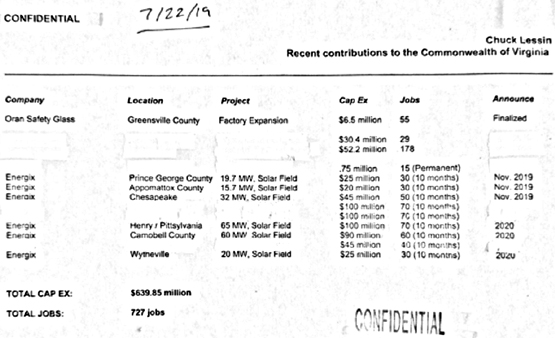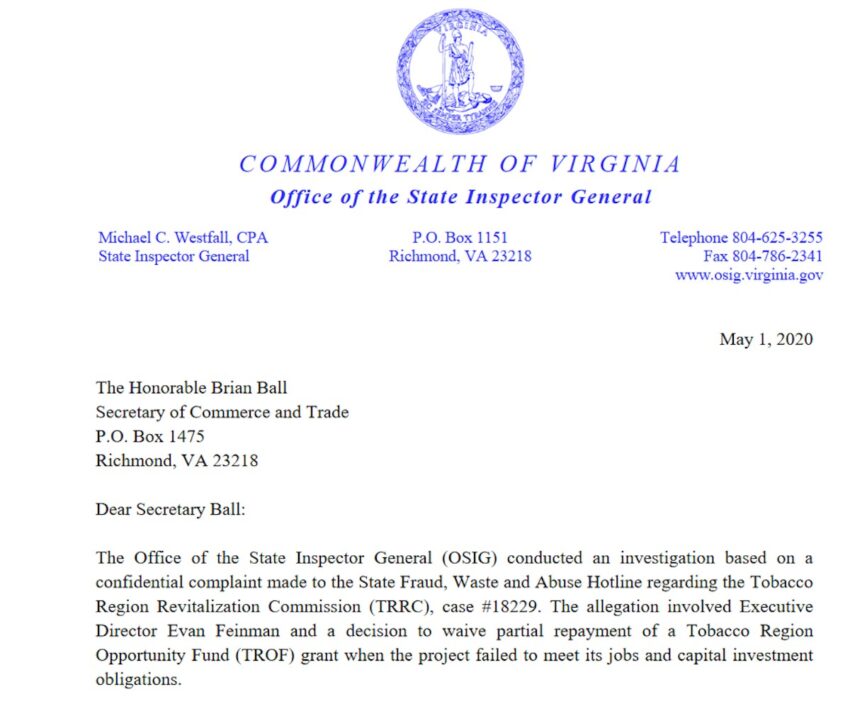Head of a billion-dollar state funding pool promises to behave
On May 1, 2020, the Virginia Office of the State Inspector General formally notified the Secretary of Commerce and Trade of improper financial dealings between the Virginia Israel Advisory Board’s vice chairman and the executive director of the Tobacco Region Revitalization Commission. According to the notification, the action was initiated following a whistleblower complaint to the state fraud, waste and abuse hotline.
The Virginia Israel Advisory Board, or VIAB, is presently the only U.S. taxpayer-funded state government entity working exclusively to give Israeli companies a foothold in the commonwealth. The Tobacco Region Revitalization Commission or TRRC distributes Virginia’s portion of the $246 billion tobacco company liability settlement struck in 1998, but largely not to smoking cessation campaigns or health-related initiatives. Rather, TRRC has distributed over a billion dollars for tobacco region development projects.
According to the OSIG letter, Virginia Israel Advisory Board Vice Chairman Charles Lessin ,who was also CEO of a joint project with Israel’s TransBioDiesel, improperly received “credit for jobs created on a separate project to avoid ‘claw-backs’ from TRRC for Appalachian’s failed project.”
Although he worked as a VIAB board member, in 2014 Lessin applied for a $565,000 TRRC grant to produce biodiesel in St. Paul, Virginia on behalf of the limited liability company he privately owned, Appalachian Biofuels.
After the project failed, Lessin asked the TRRC’s Executive Director Evan Feinman to forgive him of $210,000 in repayment of the grant that he was obligated to repay.
In July of 2019, Lessin “provided a list of projects in which he is involved as Vice Chairman of the Virginia Israel Advisory Board (VIAB) that were to be completed in TRRC’s service area.” These jobs and capital investments should cover any of the jobs creation and investment promises made by Appalachian Biofuels, LLC, according to Lessin.

On August 5, 2019, Feinman forgave Lessin’s $210,000 debt based on the forecast employment and capital investment from the list provided by Lessin. All the projects, including Oran Safety Glass and Energix were VIAB promoted ventures with Israeli companies, but none apparently carried any capital infusion from Lessin personally. Further, as the Inspector General noted, “none of these projects were completed at the time the letter was issued.” Most are still “incomplete.”
Under normal procedures, the TRRC would have continued to engage in collections or even sue VIAB Vice Chairman Lessin for repayment, as it is doing with $3.2 million in claw-backs from other non-Israel related Virginia projects.
The IG found that an allegation of wrongdoing “is substantiated.” But curiously, the IG found that the substitution of planned jobs and capital investments supposedly to be created by Lessin’s company with those of other VIAB projects was an acceptable “compromise in lieu of repayment.” The wrongdoing – according to the IG – was that the substitution deal “lacked TRRC approval as required by TROF [Tobacco Region Opportunity Fund] policy.” After the TRRC’s executive committee signaled that Lessin should not receive any special consideration, Executive Director Feinman granted it anyway, never notifying his superiors.
The ruling is troubling in that the OSIG entirely disregarded the standard language included in the Appalachian Biofuels performance grant document, which like all others, states clearly that jobs created at other companies “are not counted as fulfillment of any employment obligation made to the Commission by the Company under any other agreement.” Lessin was obligated to create 40 jobs and a quarterly payroll of $370,000 at Appalachian Biofuels LLC, irrespective of what other VIAB portfolio projects were – or mostly were not – doing.
Even if jobs and capex from VIAB projects could legally be counted toward personal VIAB board member financial obligations, there is evidence that figures on the list provided by Lessin are highly inflated, and like Appalachian Biofuels, may never come to fruition.
Of the 270 jobs building Energix solar utility arrays cited by Lessin, all are temporary construction jobs lasting ten months or less. Even the Tobacco Commission divides these job counts by a factor of three – equivalent to 90 permanent jobs.
The capital expenditures on the “Lessin List” are suspect as well. Although Lessin listed an Energix solar utility in Chesapeake as generating a $45 million capital expenditure, its actual building permit application claimed only $23 million in construction costs.
It is not presently clear whether all of the Energix projects will come to fruition. Because Energix has built and operates utility scale projects in the Israeli occupied West Bank and Golan Heights, and has been designated by the UNHCR as a human rights violator, it is facing growing public opposition to its dozen or so projects in Virginia.
Energix has grown accustomed to lavish US solar tax credits and loan subsidies. According to the Small Business Administration, a contractor-heavy U.S. subsidiary of Energix, which claims only 25 employees at its overseas headquarters in Israel, received $2-5 million in forgivable Paycheck Protection Program (PPP) loans from a fellow Israeli company with operations in Israeli occupied territory, Bank Leumi.
Many TRRC grant recipients – that do not have deep ties to state and national Israel affinity organizations – would no doubt like to have their own claw-backs owed to the TRCC be forgiven. Under the past system, all they would have to do is provide a promissory list of job-creating businesses to Executive Director Feinman, perhaps a state-wide network of temporary Kool-Aid stands to beat the summer heat.
Evan Feinman has formally apologized for his actions and said he would mend his ways. But going forward, and despite the mild rebuke from OSIG, the new “get approval first” claw-back forgiveness policy could be of immense benefit to VIAB. As an example, since 2014 VIAB has been promising to create a hundred-million-dollar fish farm in economically depressed Tazewell County. The “Project Jonah” initiative, launched with help from the American Israel Public Affairs Committee (AIPAC), may now be allowed to wriggle out of millions in TRCC grant repayments, provided a VIAB board member submits yet another list of proposed job creating VIAB projects and lofty capital expenditure projections.

